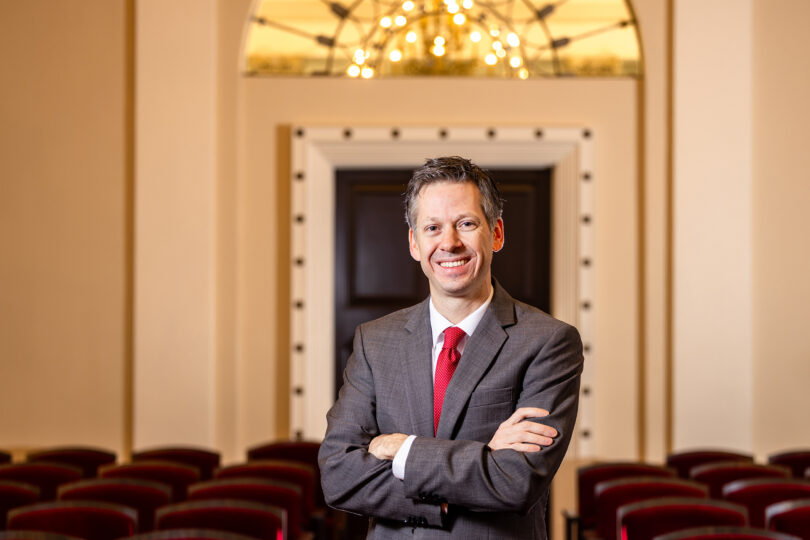Understanding that “psychology affects every single aspect of law,” assistant professor John B. Meixner Jr. is teaching a brand new class this spring at the School of Law.
Titled “Law and the Mind,” the course will be a mixture of law, psychology and neuroscience and include such topics as judge and jury decision-making, the psychological basis of criminal culpability and the psychological justifications for various legal rules and doctrines.
The course is a natural evolution from Meixner’s background, which includes a Ph.D. in psychology and a law degree from Northwestern University. He also worked at a large civil litigation firm, spent six years as an assistant U.S. attorney in the Eastern District of Michigan and served as a judicial clerk at both the U.S. Court of Appeals for the 4th Circuit and the U.S. District Court for the Eastern District of Michigan.
“I quickly learned, especially in the federal system, that almost everything important that happens in criminal law happens at sentencing,” Meixner said. “I remember being struck that there’s a wide array of things that judges can consider [in sentencing], not just sort of the facts about the crime itself, but things about the background of the defendants. For example, how did they grow up? What happened in the rest of their life? What were the reasons why [the crime] happened?”
Knowing that judges have an enormous amount of discretion, Meixner said he found it interesting—and worrisome—that defense attorneys only sometimes focused heavily on the defendants’ background.
“Sometimes, defendants were humanized really well by their attorneys, and sometimes not at all,” he said.
This has led to one of his current research projects that involves analyzing a large sample of federal sentencing briefs and coding the different kinds of arguments about sentencing mitigation, quantifying the amount of time and weight they put on each argument and then correlating that with judges’ sentencing decisions to try to see what judges care about and how they weigh these different aspects.
For instance, he found that “when defendants make arguments about health-related mitigation—often things like untreated mental illness—then judges’ sentencing decisions tended to be much lower, even when you control for other kinds of factors.”
Meixner, who joined the School of Law faculty in fall 2022, said his decision to come to Athens was multifaceted. In addition to his wife securing a faculty position with the AU/UGA Medical Partnership, he said one of the primary reasons they chose Georgia was the law school faculty. “I don’t think I came across any other faculty that had the same combination of intellectual strength and genuine kindness. It’s a unique group.”
He has also discovered that, in addition to being smart and prepared, his evidence and criminal law students are sincerely inquisitive. “I knew that they would be on point and ready, but I’ve been impressed by how curious they are about understanding why the law is structured the way it is, and whether it should be different. They want to know more than just what they need to pass the bar and do their day-to-day jobs later on.”
At the end of the day, Meixner wants his students to be good and clear analytical thinkers because that is “what judges are looking for when they rule on an evidentiary issue or when responding to a motion in criminal practice.”
He also wants them to be kind and good moral citizens who have thought carefully about the reasons why we have a criminal law in the first place and how criminal law should be structured.
“That’s a hard topic because everyone has different intuitions about it,” Meixner said. “When you try to decipher the underlying rationales for punishment, you have to confront serious moral and philosophical questions of what our goals are for our communities and relationships.”
Meixner’s new course will provide a good opportunity to explore more of the why. And, with class enrollment at capacity, it seems that law students agree.








